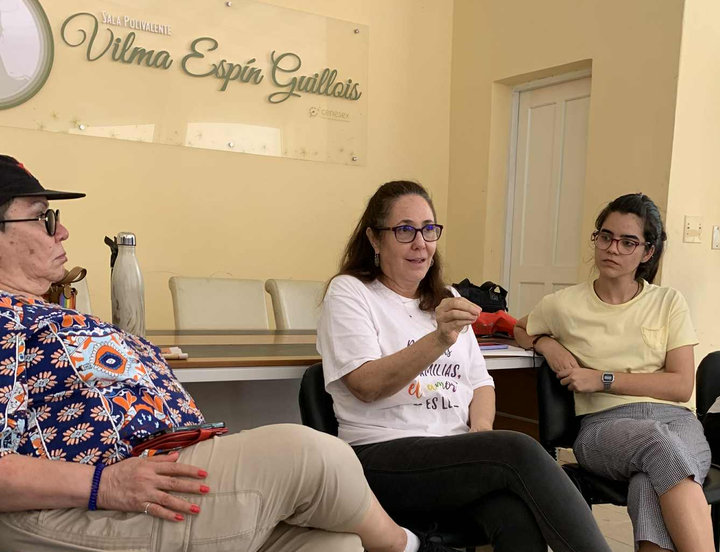
Following are follow-up comments made by Mariela Castro Espín after a talk on July 29 at the ICAP (Instituto Cubano de Amistad con los Pueblos / Cuban Institute of Friendship with the Peoples) House of Friendship, in Havana, Cuba, with the participation of the Venceremos Brigade and LGBTIQ+ activists from the United States, along with members of the community networks linked to Cenesex (Centro Nacional de Educación Sexual / National Center for Sex Education), among other invited individuals.
This event was the Cuban launch of the book published in the U.S. by Struggle-La Lucha, “Love is the law: Cuba’s queer rights revolution.” Castro Espín contributed to the book, and is the director of Cenesex, which has led the way in advancing LGBTQI+ rights.
Transcribed and translated by Gregory E. Williams
I still have one thing left to say. When we were discussing the Constitution and the Families Code, we were very scared. And sometimes, we thought, what are we going to do if it’s not approved? Do you remember, Paquito, how we all argued? What are we going to do if the Families Code isn’t approved in the referendum and in the Constitution?
I’m not going to say what he told me, but we thought about it. We thought about what we’re going to do if the popular referendum doesn’t approve it.
The debates were very interesting. We had to run a very strong communications campaign. When there wasn’t much experience in Cuba with communications campaigns, how do you do it?
When we still didn’t have much experience in conducting communications campaigns, we began learning step by step, but with the desire to convince. And we succeeded. However, now, in the latest laws that have been passed, the most interesting aspect has been the flexibility that exists.
People are already convinced. And I’ll give you an example: the Cuban Sports System Law. We at Cenesex had put more energy into the Law on Children, Adolescents, and Youth and the Civil Registry Law, which was a challenge that would take many years.
And, honestly, we hadn’t put much energy into sports. So it was written in a very general way, so that the situation could be resolved in the regulations that were supposed to follow.
So people were very relaxed. And at the last minute, [name] sent me, via WhatsApp, a number of ideas and changes, aware that it was quite late, because the law had already been widely discussed. That bill was already almost perfect for taking to the National Assembly.
He was aware of it. Still, with support from the legal team at Cenesex, a letter was prepared for the drafting committee, informing them that this group of transmasculine activists was making this proposal, and that we considered it fair to include them.
The drafting committee immediately responded to us. So, which ones were included in the law? And which ones were included in the regulations that would be applied later? There was no discussion. They were assimilated.
They thought it was very fair and in line with the Constitution. It didn’t change the essence of what was already written; on the contrary, it strengthened it. And, as Paquito can tell you, it was impressive. We’ve changed. Society has changed.
Not as much as we had hoped for. But from our legal perspective, that’s evidence of the changes these institutions and these laws are making in Cuban society.
Join the Struggle-La Lucha Telegram channel
